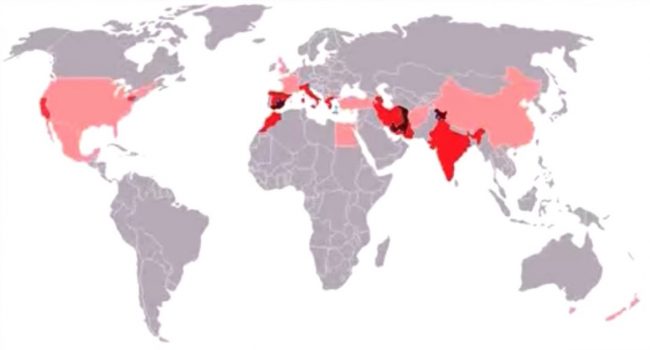
According to our experience, it is wise to buy saffron from the region where most of the producers are located – Iran. The producer should be compliant with HACCP and ISO, they should also regularly test their production in the lab.
World’s saffron comes mostly (85%) from Iran. The rest is cultivated in India, Afghanistan, Greece, Spain, Morocco and Italy. There are also micro growers in France, USA, and Argentina. When you are looking for saffron seller, be sure to check the quality and price of the saffron. Try to understand the background of the supplier. It is important the seller has experience and reputation in the field.
Saffron is mostly manufactured in Iran
According to the Statistics Iran is the biggest saffron producer in the world. Iran produces approximately 85% of the saffron.This statistics is from 2016. That year Iran produced 336 tons. According to predictions the demand and production is set to grow. Some have estimated Iran will produce 500 tons in 2020. In 2016, the second biggest producer was India with only 22 tons, then game minor players. It should be noted, the statistics has changed during the last couple of years, with Afghanistan emerging to the arena. However the numbers still demonstrate the Iran’s dominance in the sector.
In 2016 Iran exported saffron to 62 countries, with main importers being: Spain, America, India, France, Sweden, Argentina, Saudi Arabia, Hong Kong, Switzerland, and the Emirates.
It should be noted, the saffron statistics is somewhat incorrect when looking at the world export numbers. According to statistics Spain is big exporter, however it is also the biggest importer of saffron form Iran. So, it looks like the Iranian saffron becomes Spanish at one point.
Where to buy saffron
Knowing that most of the saffron is cultivated in Iran, it then makes sense to buy the saffron from Iran. However it is somewhat difficult task, unfortunately Iran is under sanctions. Iranian sellers and suppliers are somewhat isolated from making business with the rest of the world. The saffron farming and manufacturing is divided by many small companies, which is good in the way. It keeps competition in place, and locals make money equally.
It is little bit difficult for foreigners to deal with local saffron selling companies, because of the language barrier and cultural differences. Iran is highly regulated by laws and regulations, most of the farmers are not able to export directly. Producers are playing important role. They are checking the quality, sorting the product, stocking, and packing it for the exports. They are the real sellers. There are also many traders and brokers present. The best option is to buy saffron from producers, in bulk or in retail packaging, as you like.
How to buy saffron from Iran
When you are buying saffron form Iranian producer, make sure they provide legitimate documentation. Usually they should be able to provide Certificate of Analysis, Certificate of Origin, HACCP, Phytosanitary Certificate, and ISO. With these documents you are assured to get controlled products, and you are able to clear the merchandise from the customs in your country.
When looking to buy saffron, you need to understand the difference between different saffron types. You also have an option to buy saffron in bulk, or packed according to your own packaging design for retail market.
Generally speaking saffron is prepared and sorted as Negin, Sargol, and Pushal. It can get more complicated that that, but the world markets usually align themselves according to this classification. Negin is best quality, visually and chemically. Sargol, also known as “all red” is cut thread, providing purity. Sargol is positioned for commercial use, like in pharmaceutical industry. Pushal is lower quality, with some impurities and it is visually ruffled. Saffron is harvested from September to November, usually it is gathered in November. Saffron is harvested once per year. Saffron’s taste, smell and color peaks when it is fresh. During the year the showings deplete somewhat.
The author of the article, Sneico.com works as a communication office for carefully selected saffron sellers in Iran. If you have any questions regarding the topic please contact us at office@sneico.com of see saffron supplier page
Articles About Saffron
Saffron Price Has Increased in 2018
According to deputy head of the National Saffron Council Gholam Reza 152 tons of saffron, valued at USD 240 million have been exported from Razavi
Iran Saffron Production In 2018
This year (Iranian year) Iran expects to produce over 400 tons of saffron. Saffron is planted in most of Iran’s provinces. 80% of the country’s
